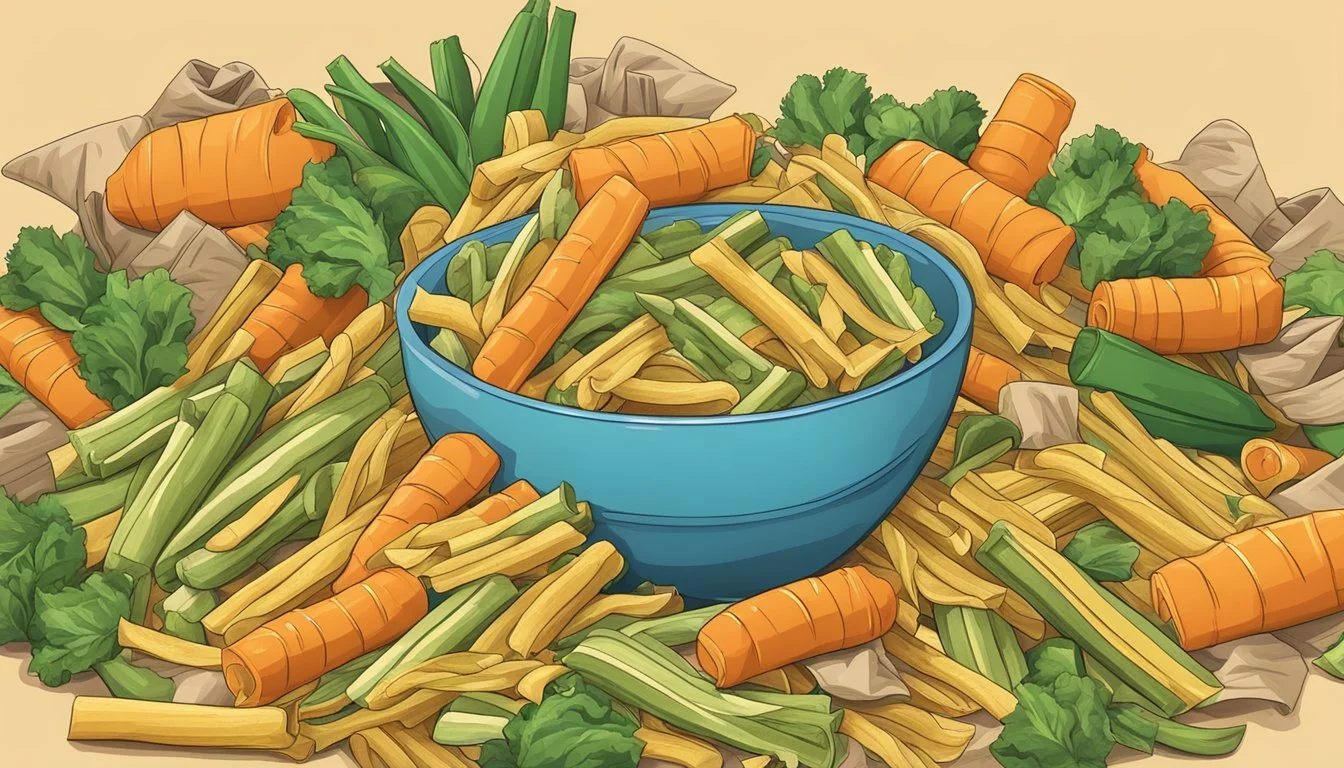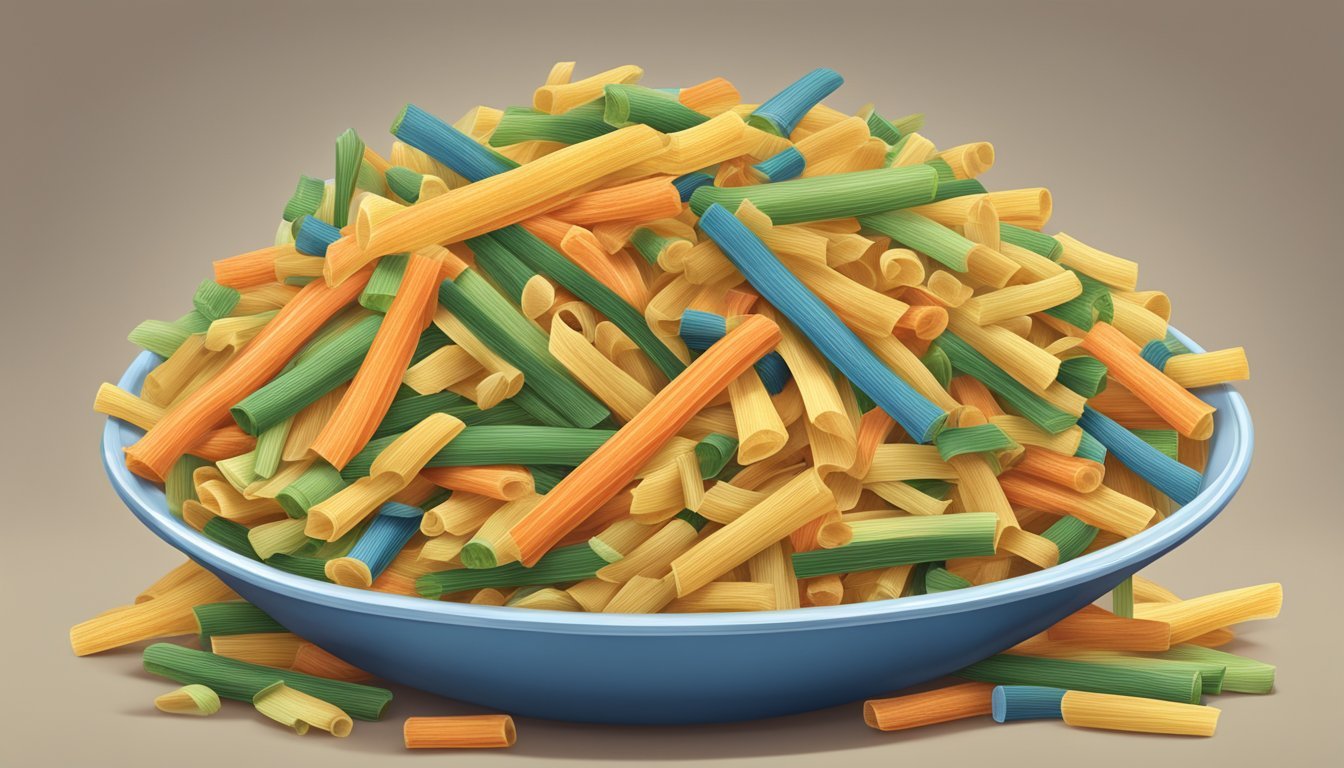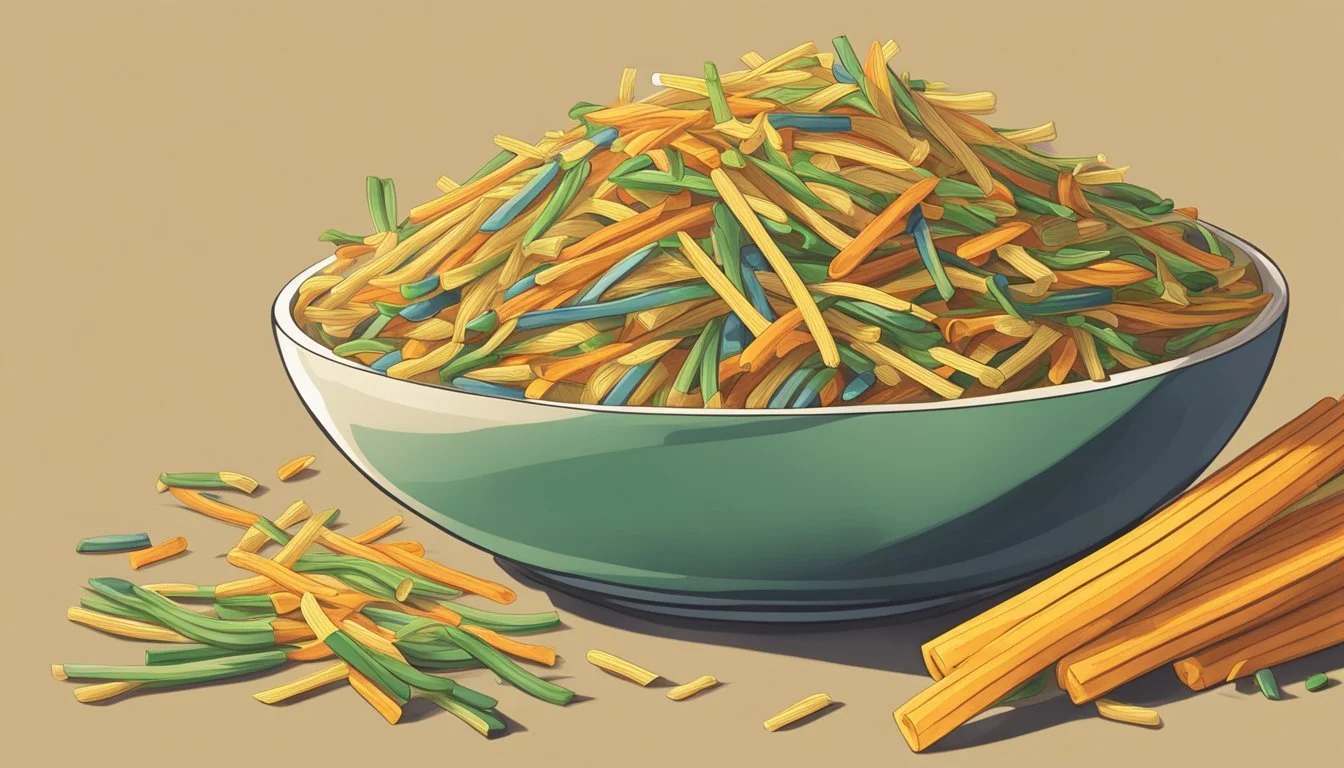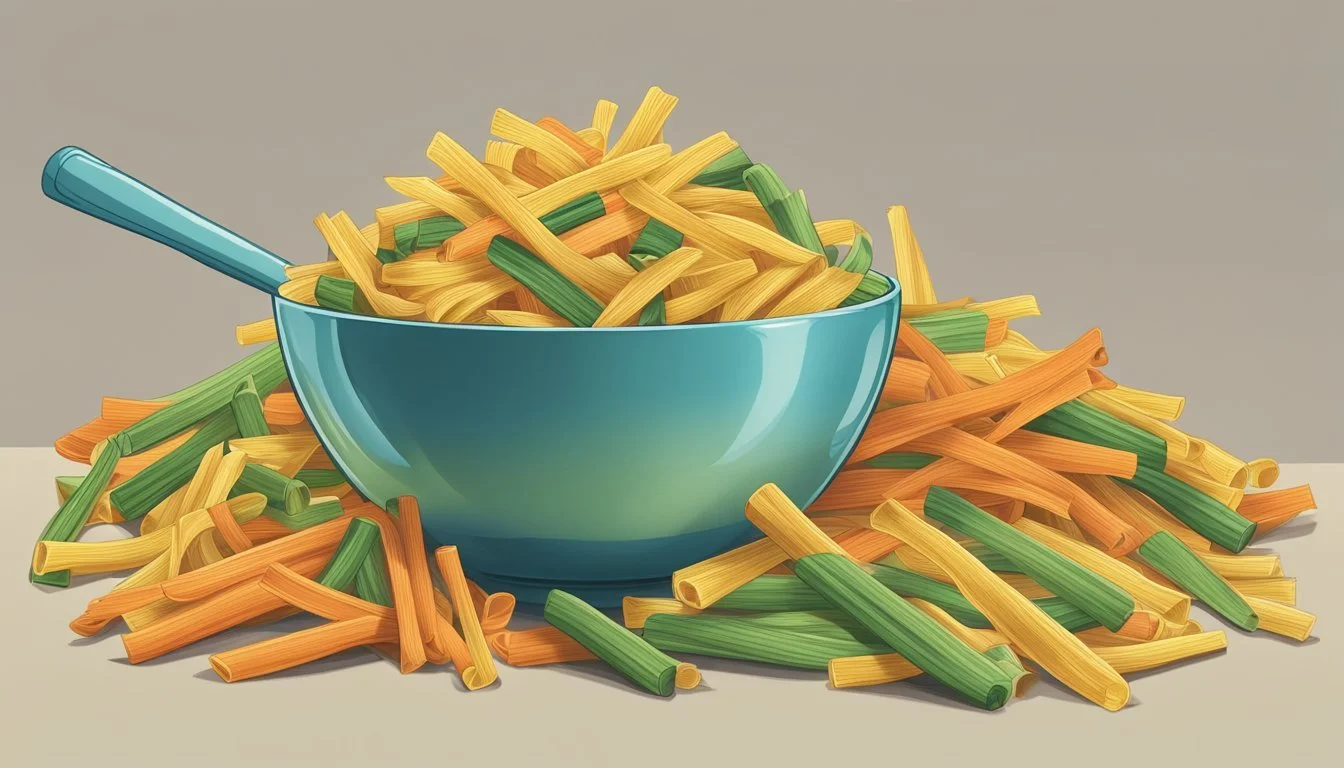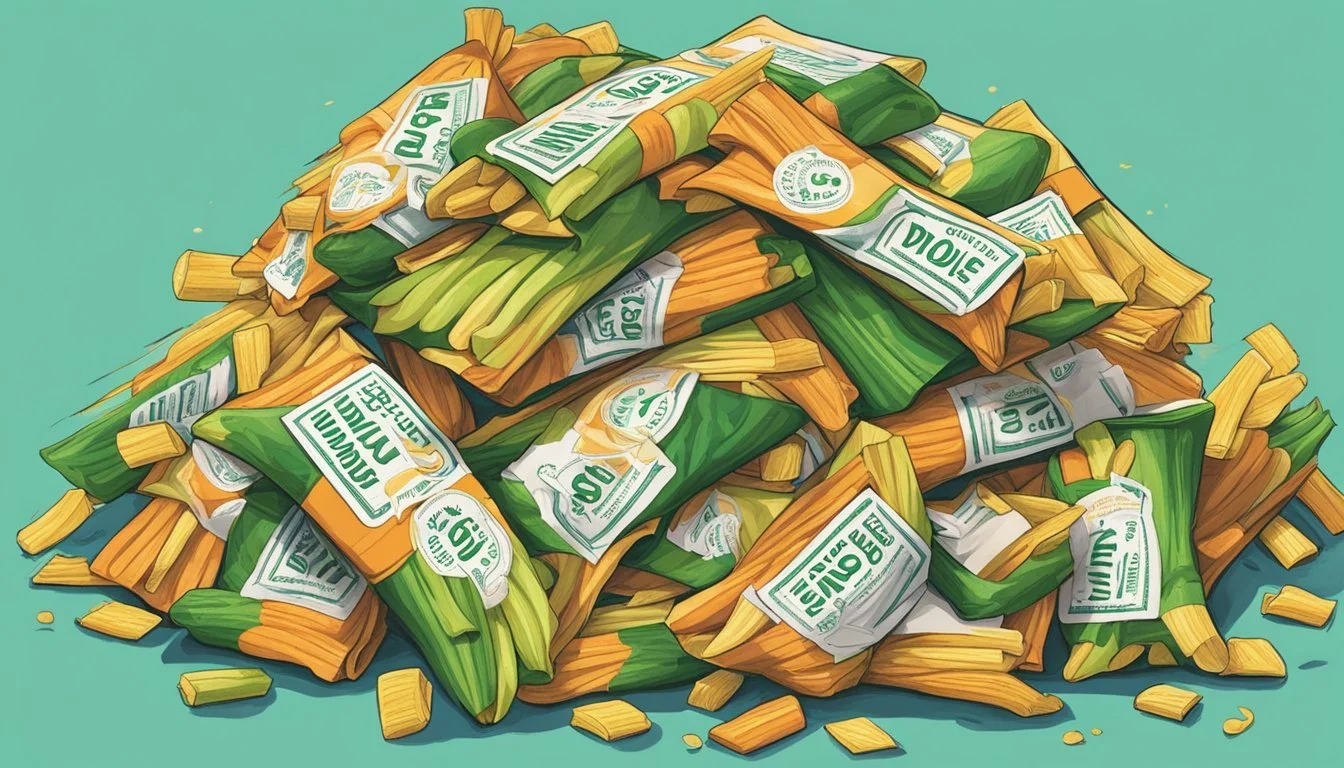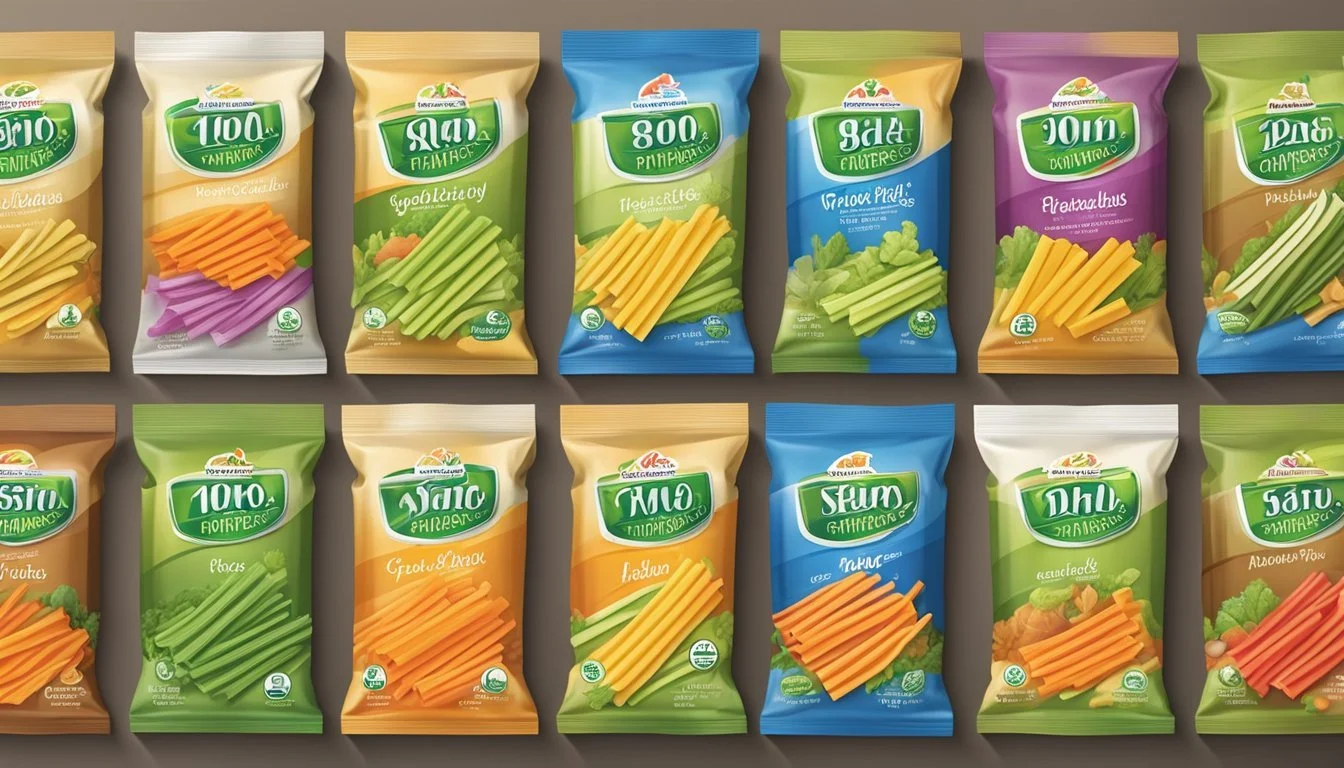How Many Servings of Sensible Portions Veggie Straws Is Too Much
Expert Guidelines
When it comes to enjoying Sensible Portions Veggie Straws as a healthy snack, moderation is key. Veggie Straws are a popular option due to their gluten-free, GMO-free, and kosher-certified status. Although they are relatively low in calories, each serving contains a significant amount of fat and sodium, which can accumulate quickly if consumed in excess.
A single serving of Veggie Straws, typically around one ounce or 38 pieces, has approximately 130 calories, 7 grams of fat, and 220 milligrams of sodium. Given these nutritional aspects, having multiple servings can lead to a higher intake of fats and sodium than recommended, particularly if they become a frequent part of your diet. It would be advisable to limit consumption to one serving at a time to avoid overindulging in these elements.
Balancing a diet with other nutritious foods is essential. While Veggie Straws can be a more appealing alternative to traditional chips, they should not be mistaken for a high-fiber or protein-rich option. Enjoying them in moderation, paired with other healthier choices, can help maintain a balanced diet without overconsuming fats and sodium.
Understanding Sensible Portions Veggie Straws
Sensible Portions Veggie Straws are marketed as a healthier snack option. This section covers their composition, nutritional details, and ingredients.
What Are Veggie Straws
Veggie Straws are a type of snack made from a blend of potato-based ingredients and vegetable powders. These snacks are distinctive for their crunchy texture and various flavors such as Sea Salt, Zesty Ranch, and Cheddar Cheese.
They are often compared to traditional potato chips due to their similar calorie content and fat levels but are advertised as healthier due to fewer artificial ingredients.
Nutritional Profile
A typical serving size of Sensible Portions Veggie Straws is one ounce (28 grams). This serving contains approximately:
Calories: 130-140
Total Fat: 7 grams
Saturated Fat: 0.5 grams
Sodium: 220 milligrams
Sugars: 0 grams
Fiber: 1 gram
Protein: 1 gram
These snacks have 30% less fat than the leading brand of potato chips. They also contain 0mg of cholesterol and 0g of trans fat per serving, making them an appealing option for those watching their fat intake.
Ingredients Breakdown
Sensible Portions Veggie Straws contain a mixture of different ingredients. The primary components include:
Potato Starch and Potato Flour: These provide the base for the snack, contributing to its texture and bulk.
Corn Starch: This helps in binding and gives structure to the straws.
Vegetable Powders: Such as Spinach Powder, Tomato Paste, and Beetroot Powder. These ingredients add color and a small amount of nutrients.
In addition to these, the straws are seasoned with various spices and natural flavors. The product is generally certified Kosher and gluten-free, making it suitable for a wide audience.
Overall, while Veggie Straws may not be a significant source of vitamins and minerals, they are a lower-fat alternative to traditional snacks, using a blend of potato and vegetable-based ingredients to appeal to those looking for a lighter option.
Health Considerations
When considering the health implications of consuming Sensible Portions Veggie Straws, it is important to compare them to regular potato chips, understand their impact on diet and nutrition, and be aware of any allergens and dietary restrictions.
Comparing to Regular Potato Chips
Sensible Portions Veggie Straws offer an alternative to potato chips with several distinctions in their nutritional profile. They contain about 30% less fat than leading brands of regular potato chips, making them a somewhat healthier alternative. For instance, a serving of veggie straws has 130 calories, 7 grams of total fat, and 1 gram of saturated fat.
In contrast, regular potato chips tend to have higher fat content and calories. This can make veggie straws a better option for those concerned about heart disease or high blood pressure due to their lower fat and calorie content. Additionally, veggie straws contain zero cholesterol and trans fats, which can contribute positively to overall heart health.
Impact on Diet and Nutrition
From a diet and nutrition perspective, Sensible Portions Veggie Straws are relatively low in nutrients. They have 0 grams of dietary fiber and less than 1 gram of protein per serving. This makes them less nutritious compared to snacks that offer higher fiber and protein contents, which are crucial for a balanced diet.
Despite being made from real vegetables, the processing of veggie straws often strips them of significant vegetable intake benefits. While they can be considered a moderately healthier alternative to regular potato chips, relying on them as a primary snack could lead to missing out on essential nutrients found in whole vegetables.
Allergens and Dietary Restrictions
Veggie straws accommodate several dietary restrictions and preferences. They are often certified gluten-free and Kosher, making them suitable for a wider audience. This can be particularly beneficial for individuals with gluten intolerance or those following a Kosher diet.
However, it's important to check the packaging for any potential allergens. While they are generally free of common allergens like nuts and soy, cross-contamination in manufacturing facilities can happen. Additionally, veggie straws do not contain genetically modified organisms (GMOs), which may appeal to consumers looking for non-GMO snacks.
Consumption Guidelines
Monitoring intake is essential to maintain a balanced diet and avoid potential health issues. Here are key points regarding serving sizes and recognizing excessive consumption.
Understanding Serving Size
One serving of Sensible Portions Veggie Straws typically equals one ounce (28 grams). Each serving contains about 100 calories, 0 milligrams of cholesterol, and 0 grams of trans fat. This helps in maintaining a healthy diet.
These straws are gluten-free and certified Kosher. They are made from garden-grown potatoes and vegetables, adding a nutritious aspect. However, it's crucial to note they contain less than one gram of protein and no dietary fiber, which are important for a balanced diet.
When Is It Too Much?
Consuming more than the recommended serving jeopardizes portion control and can lead to overeating. For example, eating four servings results in 400 calories, potentially contributing to weight gain if not managed properly.
High intake of processed foods like veggie straws can increase sodium intake, which may affect blood pressure. Even though Sensible Portions Veggie Straws are marketed as a healthier snack, having too much can offset their benefits. Maintaining a sensible portion size ensures that one enjoys the snacks without adverse health impacts.
Comparative Analysis With Other Snacks
Comparing Sensible Portions Veggie Straws with other snacks can help understand their nutritional value and consumption limits. This analysis will focus on veggie straws versus other veggie-based snacks and their place among packaged, processed foods.
Veggie Straws vs. Other Veggie Snacks
Veggie straws, such as Sensible Portions Garden Veggie Straws, are made from potatoes, tomatoes, and spinach. A single serving (38 straws or 28g) contains 130 calories.
In contrast, veggie chips made from kale or sweet potatoes typically offer more fiber and vitamins. For example, kale chips might provide 50 calories per serving but significantly more vitamins A and K due to the use of whole vegetables.
Veggie straws often have added sea salt and seasoning, unlike some other veggie snacks which may have less sodium. For a healthier alternative, some brands of dehydrated vegetable chips avoid added salts and sugars, increasing their nutritional benefits and offering more vitamins and minerals while keeping calorie counts lower.
Packaged Snacks and Processed Foods
Packaged snacks like veggie straws often rank lower nutritionally than whole, unprocessed foods. Despite the veggie label, these straws lack significant nutrients found in whole vegetables.
A comparison with other popular packaged snacks, such as Cheetos Crunchy, shows veggie straws might have fewer calories but still contain processed ingredients. For example, Cheetos Crunchy has similar calorie content but includes artificial flavors and colors.
Veggie straws also contain less sugar compared to many sweet packaged snacks that include cane sugar. However, both snacks are processed and should be eaten in moderation. A clear understanding of the nutritional contents can be found in the ingredient lists and nutritional labels, emphasizing the importance of informed choices.
Marketing and Label Claims
Sensible Portions Veggie Straws are marketed as a healthy snack alternative with various health claims. Key points of interest include the use of vegetables in the product and the nutritional benefits or warnings accompanying these claims.
Decoding 'Veggie' in Veggie Straws
The term 'Veggie' in Veggie Straws can be misleading. While the product contains vegetables like potatoes, tomatoes, and spinach, these are typically processed into a powder form. This processing reduces the nutritional benefits typically associated with fresh vegetables.
Veggie Straws may appear healthier due to their vegetable content, but the actual nutritional value can be significantly lower than whole vegetables. This calls into question the product's positioning as a healthy snack.
Health Claims and Warnings
Veggie Straws boast claims of 30% less fat than leading potato chips and 0mg cholesterol. These points appeal to health-conscious consumers. However, it's important to note that Veggie Straws contain low dietary fiber and protein.
The product's labeling does not highlight these deficiencies. While they may have less fat, the overall nutritional benefit is minimal. Consumers should be aware of these warnings, as Veggie Straws may not provide the health benefits implied by their marketing.
Enhancing Your Experience
Understanding how to incorporate Sensible Portions Veggie Straws into your diet can elevate your snacking habits while keeping health factors in check. Key elements include creative uses for the straws and unique recipes or pairings.
Creative Ways to Enjoy Veggie Straws
Veggie Straws can be more than just a standalone snack. Try dipping them in hummus or guacamole for an added protein boost.
Sprinkle nutritional yeast for a cheesy flavor without the dairy.
Crush them to use as a topping for salads or soups, adding a unique crunchy texture.
Incorporate them into a bento box for a visually appealing and balanced meal.
Pairing with fresh vegetables can complement their flavors and add more vitamins and fiber.
Recipes and Pairings
Consider adding Veggie Straws to your smoothie bowl as an unconventional, crunchy garnish.
They can be used as an alternative to croutons in a Mediterranean salad, alongside tzatziki sauce for a refreshing taste.
Make a low-fat, baked version of zucchini fries using crushed Veggie Straws as a breading mix.
Mix them into trail mix with nuts, seeds, and dried fruits for a portable, nutritious snack.
Try pairing the different flavors of Veggie Straws, like Sea Salt and Zesty Ranch, with specific seasonings or spices to enhance their taste profile.
Product Variants and Flavors
Sensible Portions Veggie Straws come in a variety of flavors to cater to different taste preferences.
The Sea Salt flavor is a classic and features a simple, salty taste. This variant is popular for its light and airy texture, making it an ideal snack for any occasion.
For those who prefer a bit of zest, the Zesty Ranch flavor offers a tangy and creamy taste. This variant balances the taste of ranch seasoning with the crunch of the veggie straws.
Another popular flavor is Cheddar Cheese, which combines the rich taste of cheddar with the lightness of veggie straws. This flavor appeals to cheese lovers who seek a healthier snack option.
These flavors are often bundled in variety packs. A typical variety pack might include:
8 bags of Sea Salt
5 bags of Zesty Ranch
5 bags of Cheddar Cheese
Each pack offers convenient snack-sized portions, perfect for on-the-go munching.
Sensible Portions Veggie Straws use garden-grown potatoes and vegetables, ensuring a healthier alternative to regular potato chips. They boast 30% less fat, 0 mg cholesterol, and 0 g trans fat per serving. These snacks are also Certified Kosher and gluten-free, making them suitable for a variety of dietary needs.
Whether grabbing a pack for lunch or enjoying it while watching TV, the variety of flavors ensures there’s something for everyone to enjoy.

